Neighbor Screams Bloody Murder After His Chicken Went Into Redditor's Fenced Yard And Got Chased By Dogs
Dogs aren't just cuddle buddies; they are excellent protectors.
Since canines are incredibly loyal creatures, they can forge deep bonds with their owners. No matter how big or small a threat is, dogs will do everything in their power to protect their territory and their family.
They are the best companions through thick and thin. Moreover, it is part of their instinct to be protective.
Their senses are more enhanced than humans in terms of smell and hearing. They can detect even the faintest of scents and hear sounds that our ears can't.
They can identify threats even from a distance. That's how amazing they are as protectors of homes.
So it's only natural for a dog to chase chickens, especially when they enter the canine's territory. This story is about a Redditor's dogs that went after a neighbor's chicken.
The original poster (OP), whose username is Rissyntax_v2, wanted to be judged by the "Am I The A**hole?" (AITA) forum. Her neighbor claimed that her dogs attacked the chicken and that it died.
But when the OP's mom rescued the chicken, it was fine; it didn't have any injuries.
After the incident, the OP's mom became upset over the dogs' actions. However, the OP defended the dogs, saying it was the chicken's fault.
Her mom didn't like what she said and warned her not to express the same sentiment to the neighbor.
A dog owner believes that her dogs aren't at fault.
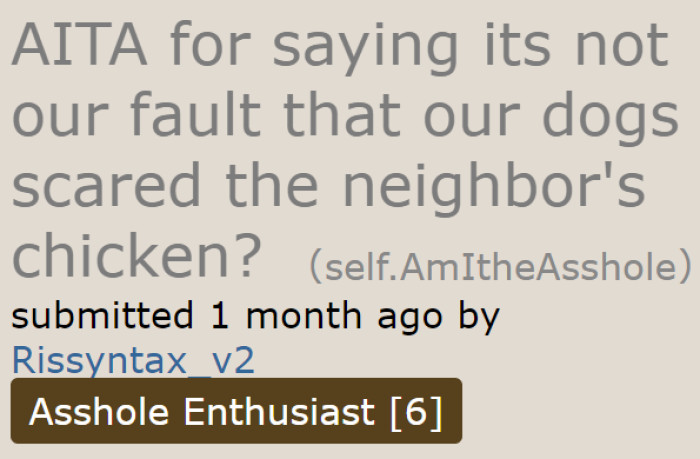
She tells the community that her dogs are unleashed within their fenced yard.

Kids would enter their yard without permission. Other animals tend to get in too.
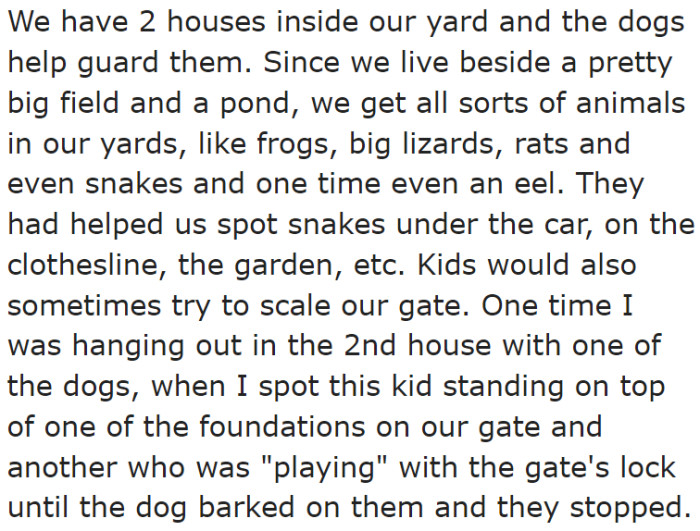
Understanding Emotional Responses in Conflict
Dr. Emily Baker, a clinical psychologist, suggests that the dramatic response from the neighbor indicates a heightened emotional sensitivity often seen in individuals with strong attachments to their pets.
Her research emphasizes that our pets are often viewed as family members, and any perceived threat to them can trigger intense protective instincts.
This phenomenon is further supported by studies in the Journal of Personality and Social Psychology, which indicate that emotional reactions can often be disproportionate when individuals feel their loved ones are endangered.
The OP's dogs chased a neighbor's chicken.
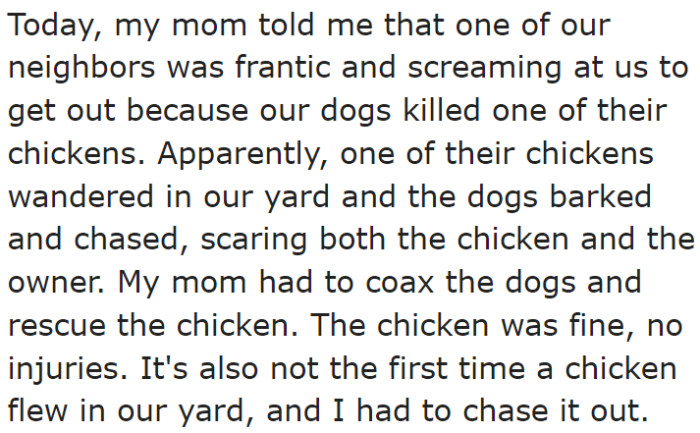
It's clear whose fault it is, but her mom didn't like it when she said that it's not the fault of the dogs.
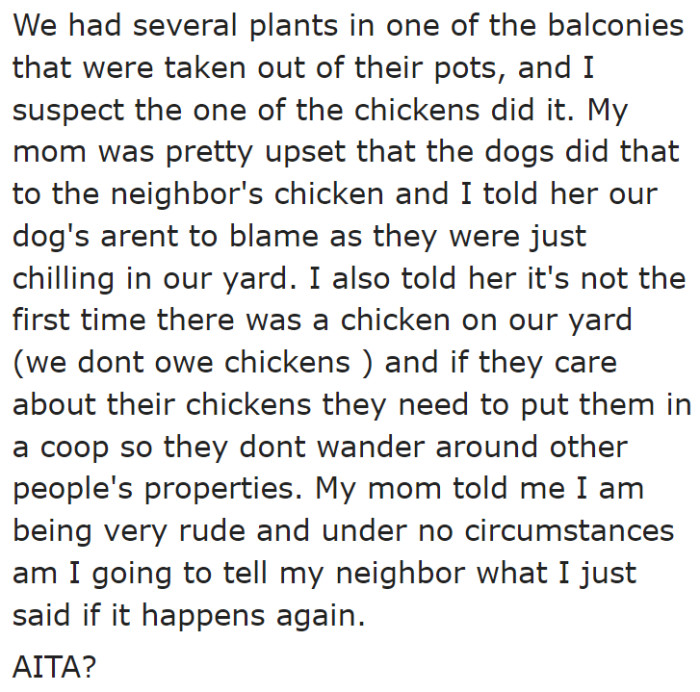
It's the neighbors who need to take responsibility for keeping their animals within their property.
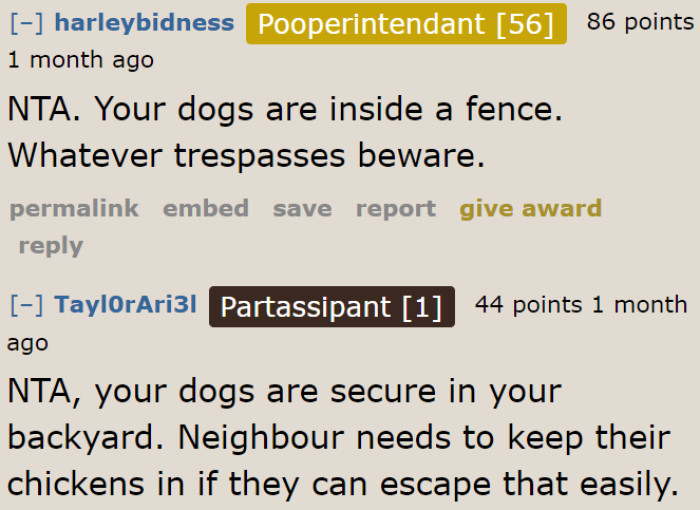
The neighbor's reaction can also be viewed through the lens of social psychology, particularly theories around territoriality and personal space.
Research shows that when people perceive a violation of their space, they can respond with aggression or heightened anxiety, as illustrated in studies from Stanford University's psychology department.
This illustrates how our emotional responses can be less about the specific incident and more about underlying fears or past experiences that resonate with the current situation.
The dogs are within their territory, so it's not their fault.
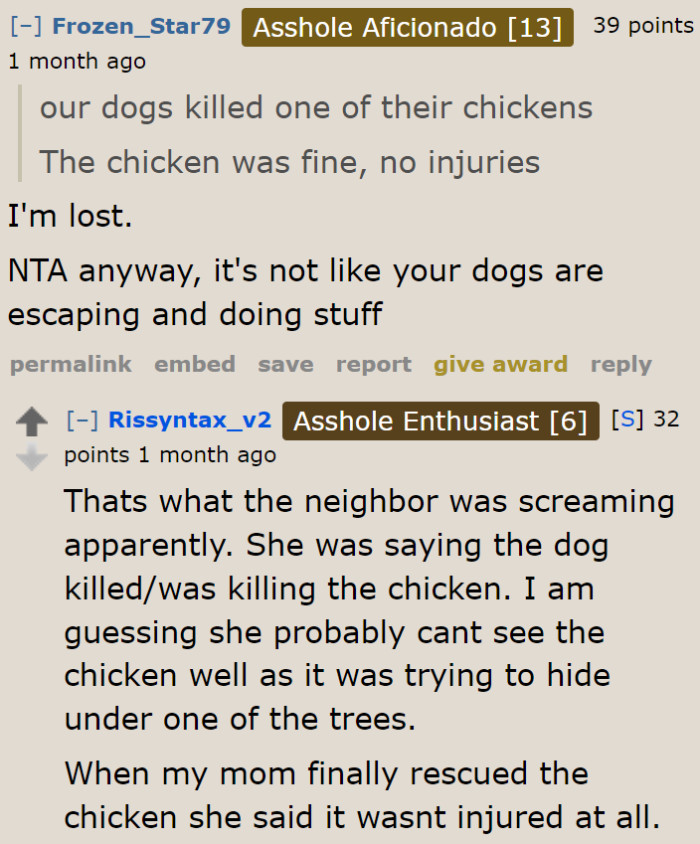
Some Redditors made the conversation light by cracking jokes.
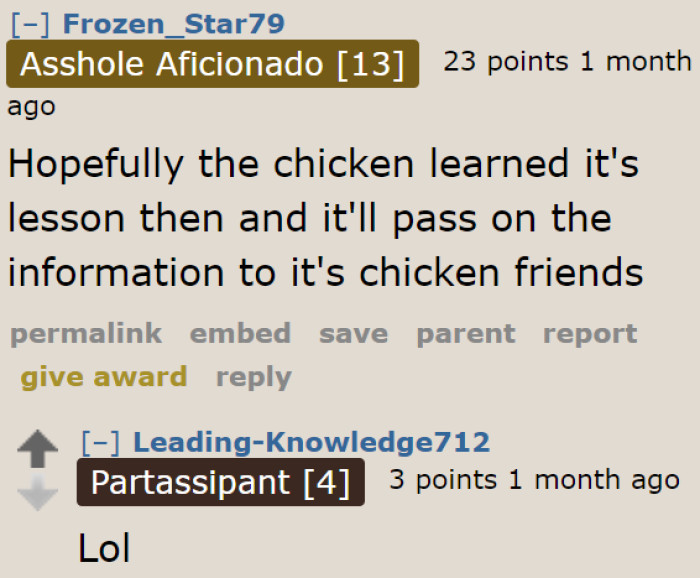
It's all the chicken's fault.
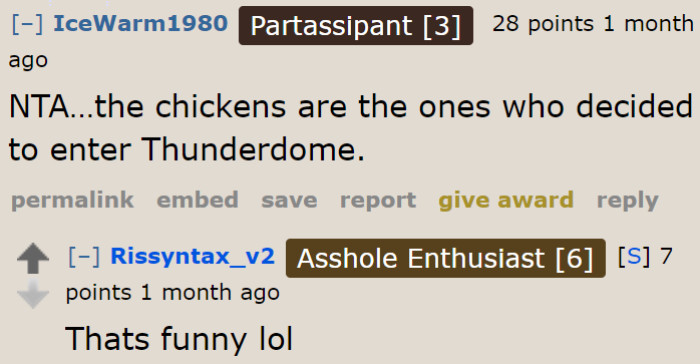
The Role of Communication in Conflict Resolution
Effective communication is essential in resolving conflicts such as this one. Research from the University of Michigan highlights the importance of active listening and expressing feelings without aggression.
It’s crucial for all parties to articulate their perspectives calmly and to seek mutual understanding rather than letting emotions escalate.
According to this research, employing 'I' statements can significantly reduce defensive reactions, leading to constructive dialogue.
Even if the dogs ended up killing the chicken, it's still not their fault.
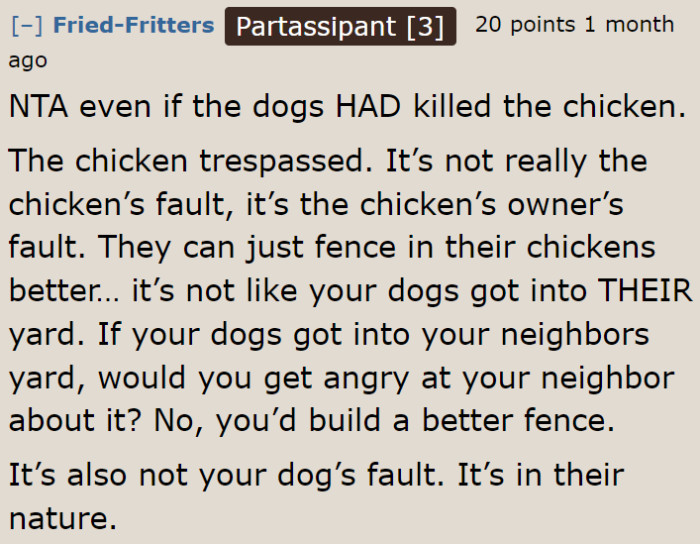
The neighbor should know better.
We're pretty sure she's aware that there are dogs in the neighborhood. So why is she letting her chickens roam around?
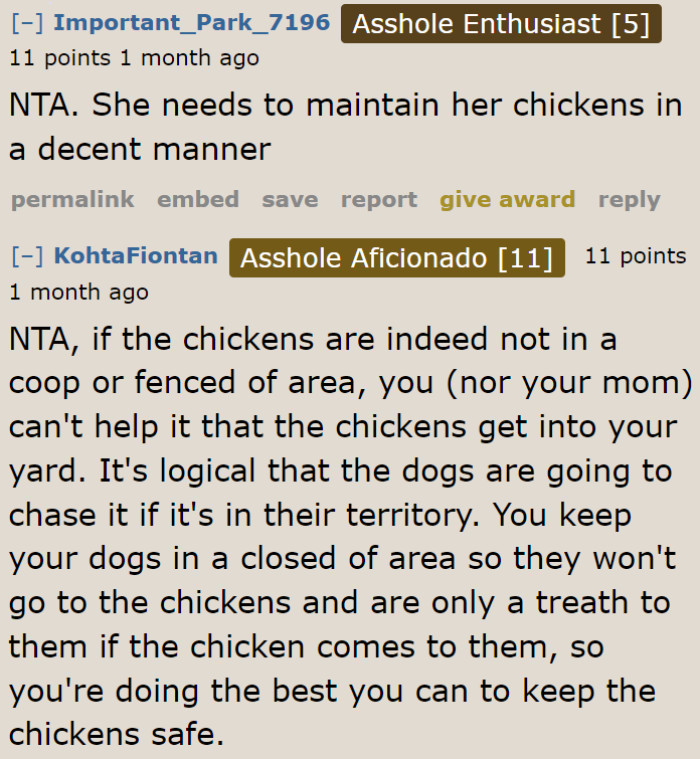
The dogs were just doing their job as protectors.
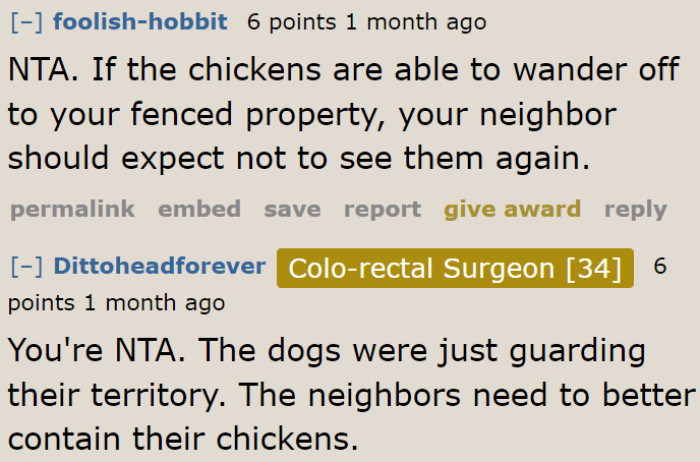
Additionally, understanding the psychological concepts of empathy and perspective-taking can be beneficial in situations like this.
Studies indicate that when we take the time to understand the feelings and motivations of others, we can diffuse potentially volatile interactions and promote collaboration.
Utilizing these skills may help both parties navigate their feelings regarding the incident with the chicken and the dogs, fostering a sense of community rather than conflict.
This neighbor needs to do something about her chickens if she doesn't want it to happen again.
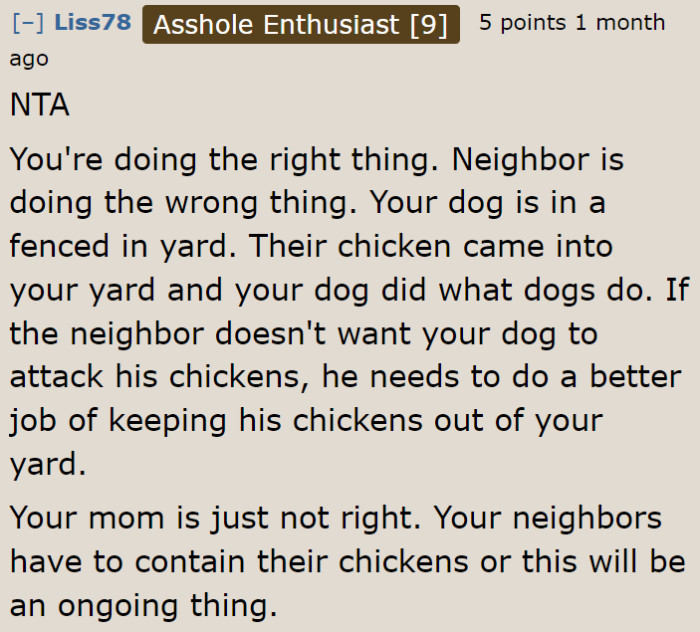
If the neighbor lets her chickens roam freely, they're bound to be in danger.
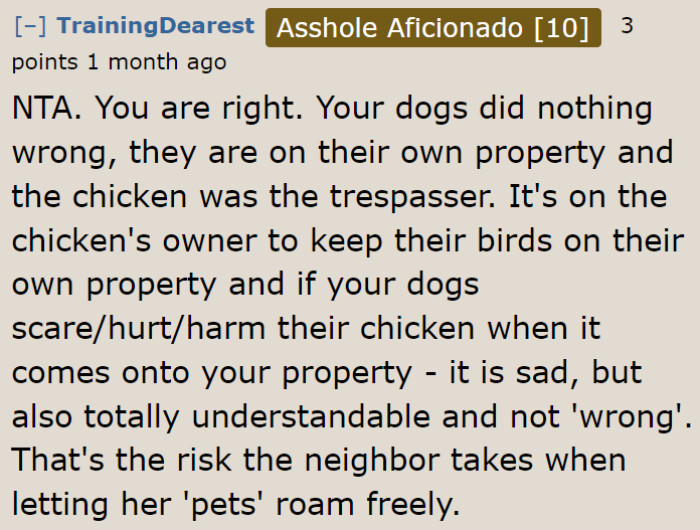
The property is fenced, so this will never be on the OP.
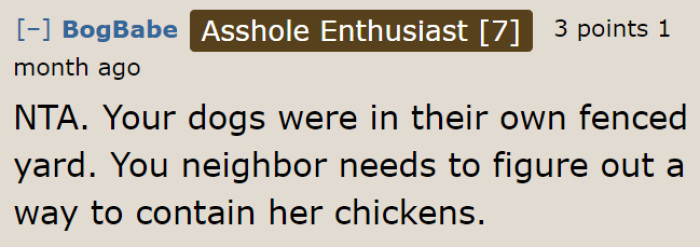
Property rights may vary by country, so the OP needs to check her local laws too.
In some countries
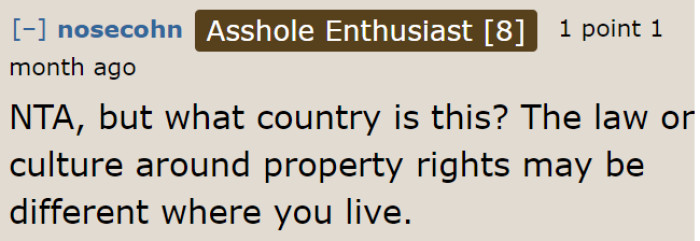
The dogs are just being dogs.
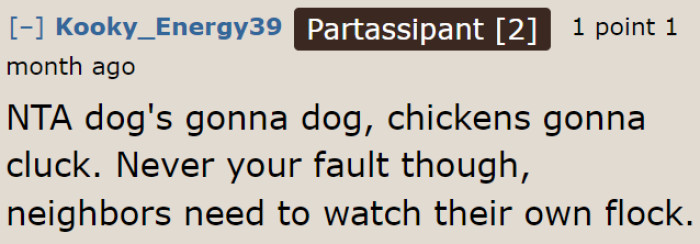
If the OP encounters the chicken's owner, maybe she can suggest clipping the chicken's wings.

Chickens can quickly turn into dinner if their owners let them roam freely.
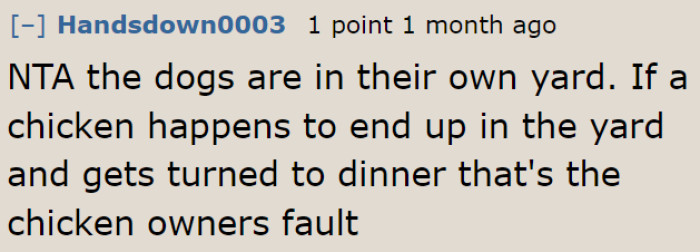
Dogs are loyal creatures, so it's natural for them to attack any trespasser.
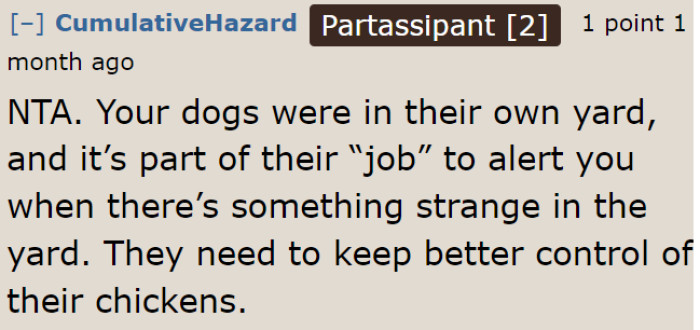
The OP can also try putting up a sign that says this.
There are lots of funny and sarcastic signs out there that go beyond saying "Beware of dog."
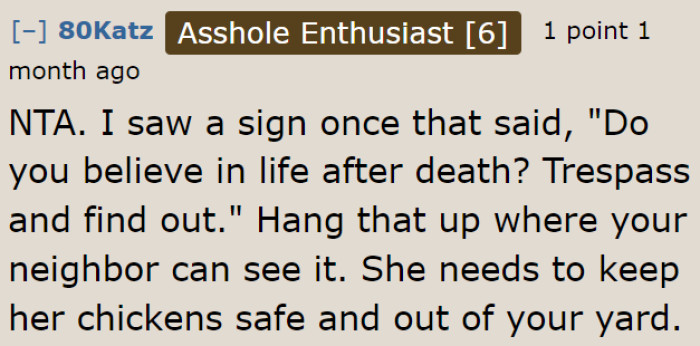
The community agrees that it's all the neighbor's fault. She needs to be more responsible by keeping her chickens from getting into her neighbor's yard.
It's either she builds a fence or places all her chickens inside the coop. Animals will prey on her chickens otherwise.
The dogs should not be blamed for doing their job.
Psychological Analysis
This incident underscores how our emotional reactions are often rooted in past experiences and personal values. The intensity of the neighbor's response suggests a strong protective instinct, indicative of how deeply we can connect with our pets.
Understanding these dynamics can help both sides approach the situation with greater compassion and a desire for resolution.
Analysis generated by AI
Analysis & Alternative Approaches
Research confirms that emotional responses in conflicts often stem from deeper psychological patterns related to attachment and territoriality.
The key takeaway is that understanding these triggers can pave the way for healthier communication and conflict resolution strategies.
As highlighted in various studies, developing empathy and active listening skills can significantly enhance interpersonal relationships.



